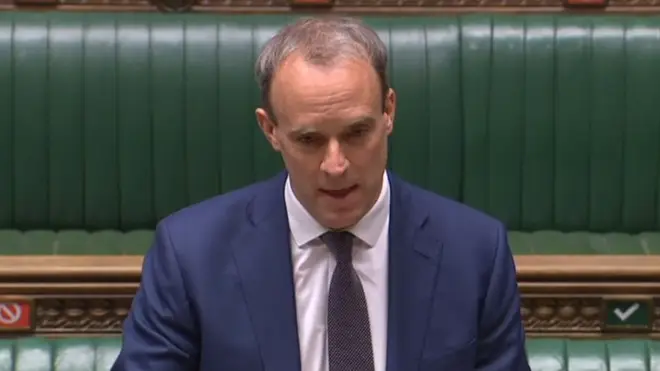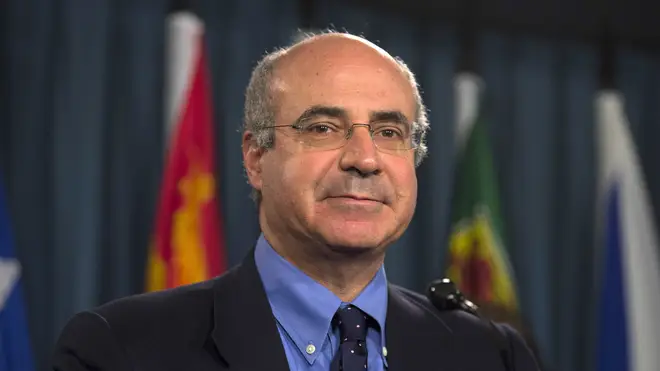
Nick Abbot 10pm - 1am
6 July 2020, 17:16

Foreign Secretary Dominic Raab has said new Magnitsky-style measures being introduced in the UK will hold the "very worst" human rights abusers to account.
Speaking to MPs in the House of Commons, he said the UK's first sanctions for human rights abuse will cover those involved in the deaths of the Russian lawyer Sergei Magnitsky and the Saudi journalist Jamal Khashoggi, the systematic killings of the Rohingyas in Burma and the North Korean gulags.
The new measures being implemented today will "hold to account the perpetrators of the worst human rights abuses," the foreign secretary said.
Making a statement in the Commons, Mr Raab added he is "proud" the Government is "bringing into force the United Kingdom's first autonomous human rights sanction regime which gives us the power to impose sanctions on those involved in the very worst human rights abuses right around the world."
Mr Raab told MPs: "These sanctions are a forensic tool, they allow us to target perpetrators without punishing the wider people of a country that may be affected."

Bill Browder celebrates the implementation of the Magnitsky Act
The UK's "autonomous sanctions" regime is aimed at people involved in serious human rights abuses, the Foreign Secretary said.
Anyone involved in such acts will be prevented from entering the UK, channelling their money through its banks, or profiting from the British economy.
The new measures will come into effect on Monday and will be the first time the country has sanctioned people or entities for human rights violations and abuses under a UK-only regime - having previously dealt with such matters under the banner of the European Union.
They will allow the UK "to work independently with allies such as the US, Canada, Australia and the European Union" in curbing the freedoms of those not under its jurisdiction.
Mr Raab said: "We will not let those who seek to inflict pain and destroy the lives of innocent victims benefit from what the UK has to offer."
A Foreign and Commonwealth Office spokesperson added: "Future targets of the regime may include those who commit unlawful killings perpetrated against journalists and media workers, or activity motivated on the grounds of religion or belief."

Putin's No 1 Enemy Bill Browder On His Battle To Uncover Corruption In Russia
Although this is the first time the UK has brought in its own "autonomous regime", it is not the first time Magnitsky-style legislation has been seen in the Commons.
The chamber unanimously passed an amendment to the country's Criminal Finances Bill inspired by the US Magnitsky Act on 21 February 2017.
It allowed the Government to freeze the assets of international human rights violators residing in the UK.
The "Magnitsky amendment" was then added to the Sanctions and Anti-Money Laundering Bill on 1 May 2018 without opposition.
Doing so also allowed the UK Government to impose sanctions on people who commit gross human rights violations.
Thank you Dominic for your leadership. You started the journey to help the Magnitsky family get justice for the murder of Sergei Magnitsky 8 years ago when you were a back bench MP and you’ve now delivered as Foreign Secretary today. We are forever grateful for what you’ve done https://t.co/CpXzQbnvUM
— Bill Browder (@Billbrowder) July 6, 2020
The UK's new legislation is not the first of its kind, having first been introduced in the US and subsequently in Canada, Estonia, Latvia and Lithuania.
Previously known as the Russia and Moldova Jackson–Vanik Repeal and Sergei Magnitsky Rule of Law Accountability Act of 2012, the bipartisan bill was passed by Congress and signed into law by former President Barack Obama in December 2012.
Its initial purpose was to punish those responsible for the death of Sergei Magnitsky, a Russian tax accountant who was arrested while investigating a large-scale theft from the Russian state that was sanctioned and carried out by Russian officials.
Magnitsky died in police custody seven days prior to his year of being legally held without trial was due to expire. In that time, he developed a number of health conditions and received inadequate medical care.
The US legislation bars those culpable from entering the United States or from using its banking system, despite Russian authorities condemning the Act and claiming Magnitsky was guilty of crimes.
As a result, Russia introduced its own version of the legislation, called the Dima Yakovlev Law, which banned Americans from adopting Russian children and implemented sanctions against US citizens involved in violating the human rights and freedoms of Russian citizens.

Head of Global Magnitsky Justice campaign Bill Browder, who has been pivotal in the introduction of Magnitsky-style legislation around the world, tweeted: "The UK Magnitsky Act will be a particularly powerful tool because every tinpot dictator wants to keep a mansion in Belgravia and send their kids to the best British boarding schools.
"The implementation of the UK Magnitsky Act also raises serious questions about why the EU is dragging their feet on the EU Magnitsky Act.
"They announced their intention in December 2019 but as of now, still nothing."
He later wrote: "Thank you Dominic for your leadership. You started the journey to help the Magnitsky family get justice for the murder of Sergei Magnitsky eight years ago when you were a backbench MP and you’ve now delivered as Foreign Secretary today.
"We are forever grateful for what you’ve done."
Sitting in the U.K. Foreign Secretary Dominic Raab’s office reviewing the Magnitsky list and waiting for him to meet Sergei’s widow and son to honor their sacrifice and show the UK government’s commitment to justice for Sergei pic.twitter.com/ys4ZyH6rBA
— Bill Browder (@Billbrowder) July 6, 2020
In 2019 the EU High Representative for Foreign Affairs, Josep Borrell told reporters in Brussels: “We have agreed to launch the preparatory work for a global sanctions regime to address serious human rights violations, which will be the European Union equivalent of the so-called Magnitsky Act of the United States."
Meanwhile, Conservative Foreign Affairs Committee chairman Tom Tugendhat, speaking in the Commons after Mr Raab, said there has been a "remarkable silence on human rights violations in China."
He called on similar sanction on those "who are either exploiting or abusing the Uighur minorities in Xinjiang or repressing democracy activists in Hong Kong."
Tory former party leader Sir Iain Duncan Smith called for Chief Executive of Hong Kong Carrie Lam to also be placed on the list for sanctions.
And the Liberal Democrat spokesman for foreign affairs Alistair Carmichael called for the Intelligence and Security Committee to be established.